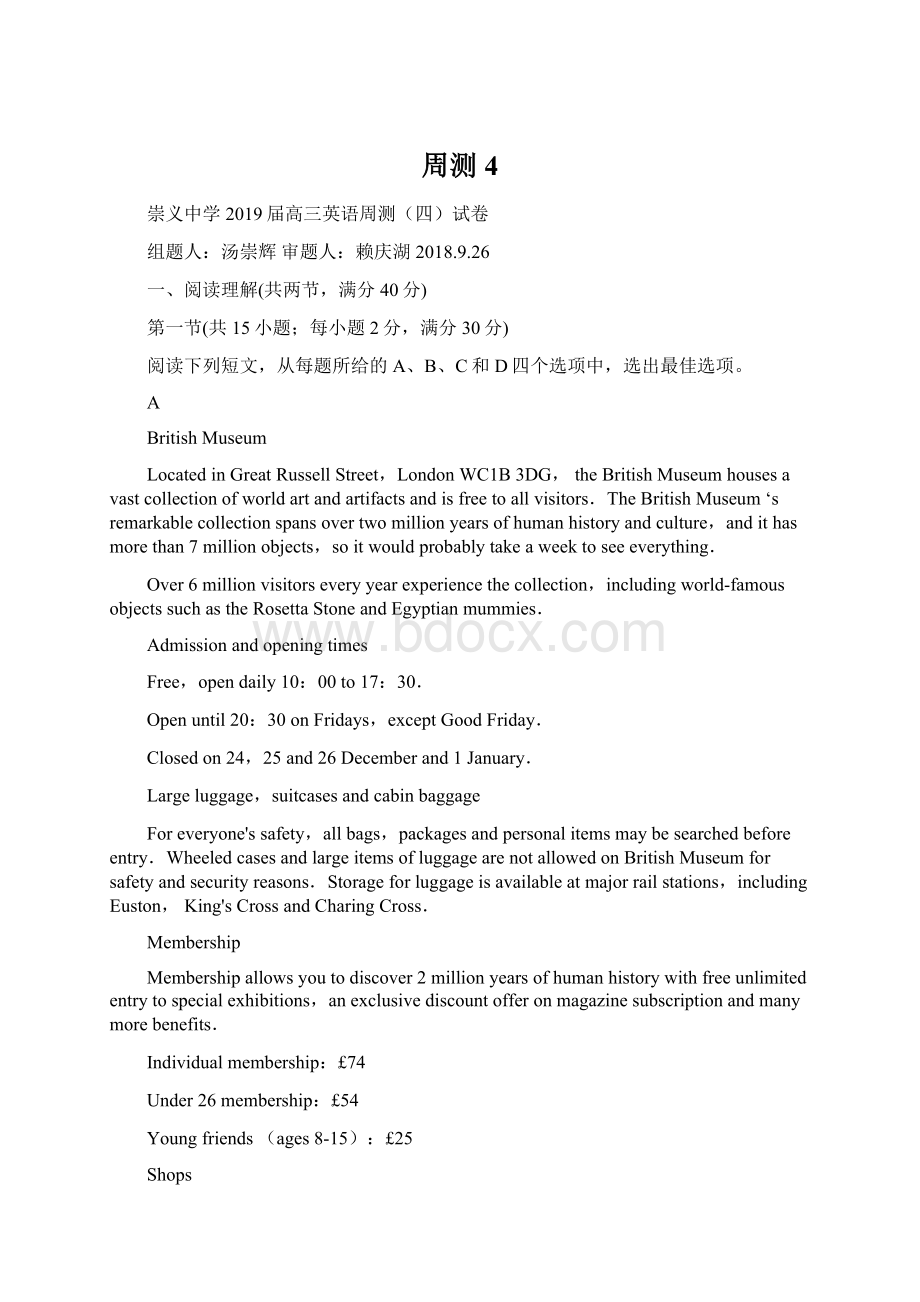周测4.docx
《周测4.docx》由会员分享,可在线阅读,更多相关《周测4.docx(10页珍藏版)》请在冰豆网上搜索。

周测4
崇义中学2019届高三英语周测(四)试卷
组题人:
汤崇辉审题人:
赖庆湖2018.9.26
一、阅读理解(共两节,满分40分)
第一节(共15小题;每小题2分,满分30分)
阅读下列短文,从每题所给的A、B、C和D四个选项中,选出最佳选项。
A
BritishMuseum
LocatedinGreatRussellStreet,LondonWC1B3DG,theBritishMuseumhousesavastcollectionofworldartandartifactsandisfreetoallvisitors.TheBritishMuseum‘sremarkablecollectionspansovertwomillionyearsofhumanhistoryandculture,andithasmorethan7millionobjects,soitwouldprobablytakeaweektoseeeverything.
Over6millionvisitorseveryyearexperiencethecollection,includingworld-famousobjectssuchastheRosettaStoneandEgyptianmummies.
Admissionandopeningtimes
Free,opendaily10:
00to17:
30.
Openuntil20:
30onFridays,exceptGoodFriday.
Closedon24,25and26Decemberand1January.
Largeluggage,suitcasesandcabinbaggage
Foreveryone'ssafety,allbags,packagesandpersonalitemsmaybesearchedbeforeentry.WheeledcasesandlargeitemsofluggagearenotallowedonBritishMuseumforsafetyandsecurityreasons.Storageforluggageisavailableatmajorrailstations,includingEuston,King'sCrossandCharingCross.
Membership
Membershipallowsyoutodiscover2millionyearsofhumanhistorywithfreeunlimitedentrytospecialexhibitions,anexclusivediscountofferonmagazinesubscriptionandmanymorebenefits.
Individualmembership:
£74
Under26membership:
£54
Youngfriends(ages8-15):
£25
Shops
TheMuseumhasfourshopswhereyoucanbuybooks,souvenirs,andfamilygifts.
41.WhencanyouvisittheBritishMuseum?
A.At9:
00Friday.B.At12:
00Monday.
C.OnChristmasDay.D.OnGoodFriday.
42.Wherecanvisitorsstoretheirlargeluggage?
A.Atmajortrainstations.B.Atsomecrossings.
C.InthehalloftheMuseum.D.AttheentrancetotheMuseum.
43.Iftwofriendsaged14and18applyformembershipoftheMuseum,howmuchshouldtheypay?
A.£25.B.£79.C.£50.D.£148.
B
AnewfamilymovedinnextdoorandIgottomeetthemotherofthefamily,Lydia.
LydiaisKorean,andherfamilymovedtoourcitysoherhusbandcouldgotograduateschool.Westartedtalking,andshewasapologeticabouthowbadherEnglishwas,butIdidn’tcare.Iknewhowharditwastolearnasecondlanguage.IenjoyedchattingwithLydiaaswewatchedourkidsplay.
Itwaswhatcamenextthatchallengedme:
LydiaaskedifI’dbewillingtohelpherwithherEnglish.
Now,Iamnotateacher.Iadmireteachers,andI’mgratefulforteachers,andit’sbecauseIadmirewhattheydosomuchthatIwasvery,verysurethatIcouldn’tdoitmyself.
ButLydiawassurethatshewantedmyhelp.Iwasdoubtful.Iwasn’tsuremy“help”wasevenworthbeingcalledbythatname.
Butbecausesheaskedme,Isaid“yes.”
Andthatwasthebeginningofourfriendship.LydiaandIspentafternoonssittingtogetherandreadingthenewspaper,andaswedid,sheaskedmequestionswhenshehadthem—questionsaboutlanguage,yes,butalsoquestionsaboutthenewcultureshefoundherselfin.
Inturn,Iaskedmyownquestions,growingcuriousaboutherhomecountryandculture.Webondedoveroursharedfaithandourstrugglesasmothersofkidswithspecialneeds.WhenIcomplimented(恭维)hercooking,shebegantoteachmeaboutKoreanfood,eventuallyleadingtoasharedtriptoexploretheKoreangrocerystoresinourcity.
BecauseofLydia,IlearnedmoreaboutmyownhometownthanIevercouldhavelearnedbymyself.
I’mstillnotsurethatI’manygoodasateacher.ButI’mgratefulIsaid“yes”whenmyneighboraskedmetohelpherwithherEnglish.Thatmeantspendingextratimewithmyneighbor,andthatextratimemeantshedidn’tremainjustmyneighbor.Shebecamemyfriend.
44.WhatwasLydiasorryabout?
A.HerbadEnglish.B.Hercarelessness.
C.NobodyteachingherEnglish.D.Herpoorlifeinanewplace.
45.Whatcanbeconcludedfromthefourthparagraph?
A.Theauthoradmiredteachers.
B.Theauthorwantedtobeateacher.
C.Theauthordidn’twanttohelpLydia.
D.TheauthorwasnotconfidentinhelpingLydia.
46.Whywastheauthorgratefulatthelastparagraph?
A.ShemanagedtolearnEnglishwell.
B.Shemadefriendswithherneighbor.
C.ShelearnedhowtocookKoreanfood.
D.Sherealizedherdreamofbeingateacher.
47.Whatcanwelearnfromthepassage?
A.Nopains,nogains.
B.Afriendinneedisafriendindeed.
C.Tohelpothersistohelpourselves.
D.Wherethereisawill,thereisaway.
C
ThesurveybyTheHarvardCrimsonwasemailedtoincomingfirstyearundergraduates;1,600studentsresponded.Resultsshowedthatatleastatenthofthestudentspolledadmittedtohavingcheatedonanexambeforestartingattheuniversity,whilealmosthalfadmittedtocheatingontheirhomework.
Athleteswereapparentlythemostpronetocheating.20percentofstudentswhoplayedauniversitysportadmittedtocheatingonanexamcomparedto9percentofstudentswhodidnot.
Thesurveyalsorevealedthatmenwerenotonlymorelikelytocheatbutwerealsomorelikelytoadmittoit.
Theresult,comparedtoaprevioussurveydoneontheclassof2013,suggestedthatcheatingmaybebecomingmorecommonplace.Oftheoutgoingseniorsonly7percentadmittedtocheatinginanexamandanother7percentsaidtheyhadbeendishonestonatake-hometest.32percentoftheseniorssaidtheyhadcheatedonhomeworkduringtheirundergraduateyears.
Thesurveyscomeinthewakeofacheatingscandalattheuniversitywhichsaw120studentsinvestigatedforsharinganswersonanexamin2012.Onerecentgraduatestated:
"CheatingwascommonplacewhenIwasatHarvard,especiallywithstudentsintheirfirstyearortwo.Iwouldsayasmanyas60percentofstudentstooknotesintosomeexams.Noonereallycaredandthefaculty(教师),wellsomeofthematleast,seemedtorecognizeandyetignoretheproblem".
InanemailtoNBCNews,JeffNeal,aHarvardrepresentative,explainedthatacommittee,madeupoffaculty,staffandstudentshadbeenestablishedto tacklecheating,which"isanationalprobleminAmericaneducation".
48.Ofthefollowing4universitystudents,whoismostlikelytocheat?
A.Jack,anathleticfreshman
B.Rose,athird-yearstudent
C.John,asecond-yearstudent
D.Maria,afirst-yearstudent
49.Accordingtopara.4&5,whichofthefollowingstatementcanbeinferred?
A.Theyhavedonemorethanonesurvey.
B.only7%oftheseniorshavecheatedintheexams.
C.Itseemsmoreandmoreundergraduatesarecheating.
D.Studentsaremorelikelytocheatintheirsenioryears.
50.WhydidTheHarvardCrimsonconductthesurvey?
A.Becausetheywanttowakeupthecheatingstudents.
B.Becausethefacultyrecognizedandyetignoredtheproblem.
C.Becausecheatinghasbecomemorecommonplace.
D.Becausetherewasacheatingscandalattheuniversity.
51.Whichwordhastheclosestmeaningtotheunderlinedword"tackle"inthelastparagraph?
A.find B.punish C.solve Dexplain.
D
AccordingtonewresearchfromtheUniversityofCambridgeinEngland,sheepareabletorecognizehumanfacesfromphotographs.
Thefarmanimals,whoaresocialandhavelargebrains,werepreviouslyknowntobeabletorecognizeoneanother,aswellasfamiliarhumans.However,theirabilitytorecognizehumanfacesfromphotosaloneisnovel.
Therecentstudy,theresultsofwhichwerepublishedinthejournalRoyalSociety:
OpenScience.Showthewoollycreaturescouldbetrainedtorecognizestillimagesofhumanfaces,includingthoseofformerPresidentBarackObamaandactressEmmaWatson.
Initially,thesheepweretrainedtoapproachcertainimagesbybeinggivenfoodrewards.Later,theywereabletorecognizetheimagesforwhichtheyhadbeenrewarded.Thesheepcouldevenrecognizeimagesoffacesshownatanangle,thoughtheirabilitytodosodeclinedbyabout15percent-thesamerateatwhichahuman'sabilitytoperformthesametaskdeclines.
"Anyonewhohasspenttimeworkingwithsheepwillknowthattheyareintelligent,individualanimalswhoareabletorecognizetheirhandlers,"saidProfessorJennyMorton,wholedtheCambridgestudy."We'veshownwithourstudythatsheephaveadvancedface-recognitionabilities,comparablewiththoseofhumansandmonkeys."
Recognizingfacesisoneofthemostimportantsocialskillsforhumanbeings,andsomedisordersofthebrain,includingHuntington'sdisease,affectthisability."Sheeparelong-livedandhavebrainsthataresimilarinsizeandcomplexitytothoseofsomemonkeys.Thatmeanstheycanbeusefulmodelstohelpusunderstanddisordersofthebrain,suchasHuntington'sdisease,thatdevelopoveralongtimeandaffectcognitiveabilities.Ourstudygivesusanotherwaytomonitorhowtheseabilitieschange,"Mortonsaid.
52.Accordingtothenewresearch,what'sunusualaboutsheep?
A.Theyhavelargebrains.
B.Theycanrecognizetheirowners.
C.Theycantellanimalsfromhumans.
D.Theycanrecognizehumanfacesfromphotographs.
53.Howdidtheresearcherstrainthesheep?
A.Byguidingthemtofollowtheirhandlers.
B.Bygivingfoodrewards.
C.Byshowingphotosofhumansandmonkeysbyturns.
D.Byshowingphotosoffamouspeople.
54.Whatcanbeinferredfromthepassage?
A.Sheephaveahigherface-recognitionabilitythanmonkeys.
B.Thesheep'sface-recognitionabilitystaysthesamewhenshownphotosatanyangle.
C.Thenewdiscoveryisbeneficialtothestudyofcognitiveabilitychanges.
D.Thesheep'sface-recognitionabilitymaypreventsomedisordersofthebrain.
55.What'sthebesttitleofthepassage?
A.ANewdiscoveryaboutSheep.B.HowSheepRecognizeEachOther.
C.AWonderfulScientist.D.TheLifeofSheep.
第二节(共5小题;每小题2分,满分10分)
根据短文内容,从短文后的选项中选出能填入空白处的最佳选项。
选项中有两项为多余选项。
Doteenagersknowhowtosleep?
Ifyou’retheparentofteens,youmightbelaugh